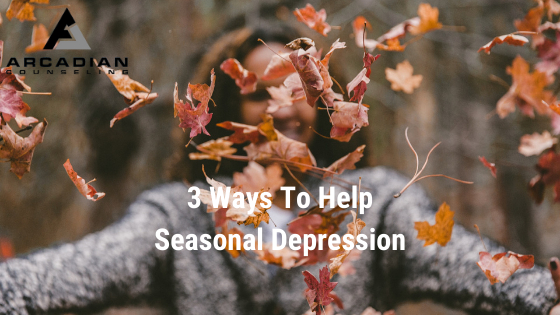Seasonal depression, also known as Seasonal Affective Disorder, or SAD for short is a form of depression that typically impacts people during the winter months, when exposure to sunlight and temperature changes naturally occur.
Research indicates that about 6% of the American population, primarily those living in the northern states, suffers from Seasonal Affective Disorder. It is also believed that 1 in 10 Americans experience subsyndromal SAD, a milder form of seasonal depression, sometimes referred to as the “winter blues.” Though seasonal depression and seasonal affective disorder can affect both men and women, it is more common among women.
Symptoms of seasonal depression include:
- Inability to focus or concentrate
- Increased weight gain
- Lethargy
- Increased appetite
- Social withdrawal
- Moodiness
While some people confuse Seasonal Affective Disorder as simply moodiness, it is a form of depression that is dependent on an individual’s hormonal state, as well as seasonal characteristics like exposure to light and temperature.
Here are 3 ways you can reduce the symptoms of Seasonal Depression that affect your quality of life.
Get Outside
Fresh air, sunshine, and exercises are the best antidote to the winter blues.
This may seem counterintuitive to some, but even though the temperatures may be a bit cooler than you’d like, it’s a great idea to bundle up and get as much sunshine as possible. Our bodies need sunlight to boost our levels of vitamin D.
Among other things, a Vitamin D deficiency has been linked to mood swings, headaches and fatigue. In addition to getting outside, it’s a good idea to eat foods high in Vitamin D during the winter months when the sun may be hiding behind the clouds more frequently. I personally add in a Vitamin D supplement from a high-quality, trusted brand just to ensure I’m getting enough.
Exercise is also one of the best ways to release the feel-good hormone, serotonin. But it is much better to walk for a half hour outside in the sunlight than to get on a treadmill inside.
So throw on a hat and gloves and head outside and get moving!
Use a Light Therapy Box
Light therapy boxes are a great way to decrease depression symptoms resulting from seasonal depression.
Of course, there will be those days when the sun refuses to show its face and the weather is too severe to spend much of any time outside. The use of a light therapy box can help reduce the symptoms of seasonal depression. It’s a great addition to the kitchen counter for the mornings when you’re getting coffee ready and it’s still dark outside.
An added bonus this can help with sleep as exposure to the rays emitted from light therapy boxes can help set your circadian rhythm – your natural sleep cycle.
The light emitted from a light therapy box mimics natural outdoor light. Light therapy is also believed to affect brain chemicals linked to mood and sleep like serotonin and melatonin which will ease the symptoms of Seasonal Affective Disorder.
Many people have said that just after a few minutes of exposure to a light therapy box, they feel an increase in their overall mood and well-being.
Here’s some additional tips and suggestions when it comes to buying a light box.
Eat More Produce
Eating more produce and decrease symptoms of anxiety.
Feelings of anxiety are a common among those suffering with seasonal depression, but according to Dr. Uma Naidoo of Harvard medical school, relief may be found at the end of your fork. Fruits and vegetables are rich sources of essential nutrients like magnesium and zinc that can decrease anxiety and increase feelings of calmness and contentment.
While you may be tempted to eat starchy comfort foods like bread and pasta, your best bet is to load up on as many whole foods as you can, with an emphasis on organic produce.
For some, the cold weather will have you dreaming about spring and sunshine, but winter doesn’t have to be another emotional obstacle in your life. By following these simple tips, you may be able to ease your symptoms of seasonal affective disorder and skate through winter.
Winter doesn’t have to be a drag. But if you feel like it’s too much to bear, life is too short to suffer. Find an awesome therapist you like and trust to help.
James Killian, LPC is the Principal Therapist & Owner of Arcadian Counseling in New Haven, CT where they specialize in helping over-thinkers, high achievers, and perfectionists reduce stress, increase fulfillment and enhance performance so they can move From Surviving To Thriving.




